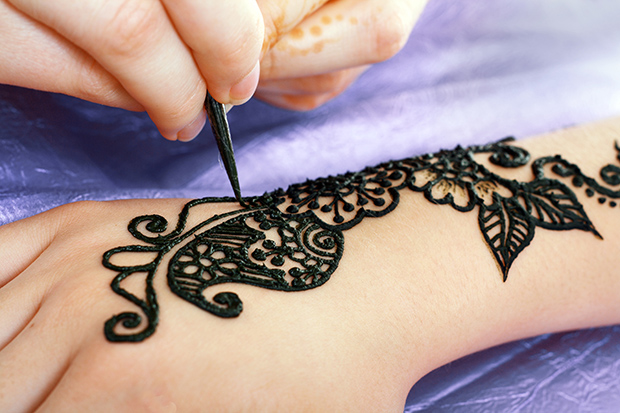Temporary tattoos have become a trendy beauty accessory for young women. However, there is a particular type of temporary tattoo that will cause some damage control on the skin. The culprit is black henna. The U.S. Food and Drug Administration (FDA) and the British Skin Foundation (BSF) have both issued warnings against the use of black henna tattoos. With the holidays fast approaching, heed this warning if you plan on using temporary body decals as part of your Halloween costume or other holiday fashions.
Henna based temporary tattoos are normally safe and will not cause any damage to the skin surface. The natural dye in henna leaves reacts with skin proteins causing a temporary orange-brown coloring of the skin.
Black henna temporary tattoos, on the other hand, are not henna. They are made with a chemical typically found in permanent hair dyes called, para-phenylenediamine (PPD). Some manufacturers add PPD to henna tattoo mixtures to reduce the application time and give a darker color.
PPD is responsible for the majority of reported skin complications resulting from black henna. It can cause blistering and painful skin burns and lead to scarring. It also can leave the user with a sensitivity for PPD, which increases their risk of a severe allergic reactions to hair dyes. For these reasons, i ts use in products that come into contact with skin has been banned in the European Union.
ts use in products that come into contact with skin has been banned in the European Union.
HOW TO FIND A SAFE TEMPORARY TATTOO
All warnings indicate that black henna tattoos should be avoided. For those of us in the U.S., we have to know what to look out for when choosing a safe temporary tattoo since this type of item is not regulated by the FDA. The FDA does, however, approve the color additives used in making temporary tattoo products.
The best way to protect your health and guarantee the quality of your body art, choose temporary tattoos from reputable manufacturers. These are manufacturers that use FDA approved color additives and meet the safety testing requirements required for retail distribution. The FDA Consumer Guide is a useful resource to consult before choosing a temporary tattoo.


Oh I had no idea that some of these tattoos could do so much damage! Good to know, thanks for bringing it to my attention!
Yeah, it’s unfortunate especially since many of them are marketed to children. Thanks so much for checking out my post. Take care 🙂